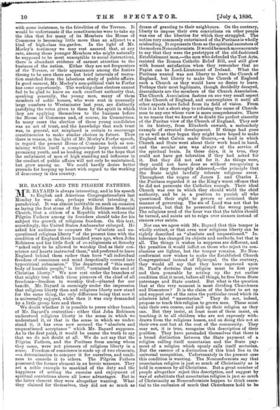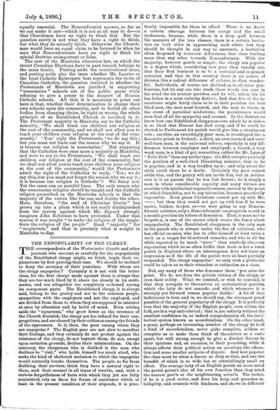MR. BAYARD AND THE PILGRIM FATHERS.
MR. BAYARD is always interesting, and in his speech to English and American Congregationalists last Monday he was also, perhaps without intending it, paradoxical. It was almost inevitable on such an occasion as laying the first stone of the John Robinson Memorial Church, that a citizen of a Republic which reckons the Pilgrim Fathers among its founders should take for his subject the growth of religious freedom. On this text, accordingly, the United States Ambassador enlarged. He asked his audience to compare the "absolute and un- questioned religious liberty" of the present time with the condition of England three hundred years ago, when John Robinson and his little flock of co-religionists at Scrooby "asked only to be allowed to worship God as their con- science and hearts instructed them," and preferred to leave England behind them rather than have "all individual freedom of conscience and mind despotically coerced into hypocritical submission." The departure of "this small body of humble people," in 1607, "contained the seed of Christian liberty." We now rest under the branches of that mighty tree which these pioneers of the chief of all freedoms—freedom to worship God—planted for our benefit. Mr. Bayard is seemingly under the impression that religious liberty then and religious liberty now stand for the same thing, the only difference being that now it is universally enjoyed, while then it was only demanded by a little group here and there. We doubt whether it is possible to prove either branch of Mr. Bayard's contention : either that John Robinson understood religious liberty in the sense in which we understand it, or that in the sense in which we under- stand it, it has even now secured the "absolute and unquestioned acceptance" which Mr. Bayard supposes. As to the first point, it would be nearer the truth to say that we do not doubt at all. We do not say that the Pilgrim Fathers, and the Puritans from among whom they came, were not pioneers of religious liberty in a sense. Freedom of conscience is made up of two elements, —a determination to conquer it for ourselves, and readi- ness to concede it to others. The Pilgrim Fathers possessed the former element in an heroic measure. They set a noble example to mankind of the duty and the happiness of setting the exercise and enjoyment of spiritual convictions above all lower advantages. But in the latter element they were altogether wanting. What they claimed for themselves, they did not so much as dream of granting to their neighbours. On the contrary, liberty to impose their own convictions on other people was one of the liberties for which they struggled. The notion very commonly entertained of the Puritans is wholly misleading. It represents them as the spiritual ancestors of the modern Nonconformists. It would be much more accurate to say that they were the prototypes of the old-fashioned Establishment men,—the men who defended the Test Acts, resisted the Roman Catholic Relief Bill, and still glow with honest satisfaction when they remember that no Papist can be Lord-Lieutenant of Ireland. What the Puritans wanted was not liberty to leave the Church of England, but liberty to make the Church of England such a Church as they would have no desire to leave. Perhaps their most legitimate, though decidedly decayed, descendants are the members of the Church Association. The Church Association fastens on one very small aspect of the Church of England, and contemplates it until all other aspects have faded from its field of vision. From this it is but a short step to refusing the name of Church- man to any one whose view is more comprehensive. There is no reason that we know of to doubt the perfect sincerity of the Puritan view of the Church of England. They saw in its history, from Elizabeth onward, a melancholy example of arrested development. If things had gone on as well as they began they might have hoped to make England what Calvin made Geneva,—a land in which Church and State went about their work hand in hand, and the secular arm was always at the service of the spiritual brain. In those days, it is true, they could not have got toleration if they had asked for it. But they did not ask for it. As things were, they could not have done so without recognising a principle they thoroughly abhorred,—the principle that the State might lawfully tolerate religious error. Throughout the reigns of James I. and Charles I. the Puritans regarded it as the King's worst offence that he did not persecute the Catholics enough. Their ideal Church was one in which they should wield the chief authority, and be in a position to punish all who questioned their right to govern or criticised their manner of governing. The sin of Laud was not that he persecuted, but that he persecuted the wrong people. The religious need of the hour was that the tables should be turned, and saints set to reign over sinners instead of sinners over saints.
Nor can we agree with Mr. Bayard that this temper is wholly extinct, or that even now religious liberty can be rightly described as "absolute and unquestioned." In- tolerance has changed its objects and methods, but that is all. The things it wishes to suppress are different, and the penalties it would inflict on those who reject its con- clusions are lighter, but the temper remains. No Non- conformist now wishes to make the Established Church Congregational instead of Episcopal. On the contrary, they would all say that they have improved upon St. Paul's doctrine that religion must be first pure and then peaceable by setting up the yet earlier condition that it must, before all things, be free from State patronage and State control. But what is the question that at this very moment is most dividing Churchmen and Dissenters ? It is the claim of the latter to set up and support out of the rates the particular creed which its admirers label "unsectarian." They do not, indeed, propose to teach this religion to grown men. These must take their own course, and pick up their religion as they can. But they insist, at least most of them insist, on teaching it to all children who are not expressly with- drawn from the religious lesson, and on doing this not at their own cost but at the cost of the community. They may not, it is true, recognise this description of their position. They have persuaded themselves that there is a broad distinction between the State payment of a religion calling itself unsectarian and the State pay- ment of a religion which openly calls itself sectarian. But the essence of a distinction of this kind lies in its universal recognition. Unfortunately in the present case this condition is wanting. The Nonconformists say that unsectarian religion is just so much of Christianity as is held in common by all Christians. But a great number of people altogether reject this description, and suggest by way of substitute that unsectarian religion is just so much of Christianity as Nonconformists happen to think essen- tial to the exclusion of much that Churchmen hold to be equally essential. The Nonconformist answer, so far as we can make it out—which it is not at all easy to do—is that Churchmen have no right to think this. But the question surely is not what they have a right to think, but what they do actually think. Otherwise the Church- man would have an equal claim to be listened to when he says that Nonconformists have no right to think his special doctrine unimportant or false. The case of the Manitoba education law, on which the recent Canadian Elections have in part turned, belongs to the same family. Putting aside the constitutional issue, and putting aside also the issue whether Mr. Laurier or the local Catholic Episcopate best represents the views of Canadian Catholics, the question involved is whether the Protestants of Manitoba are justified in supporting "unsectarian " schools out of the public purse while refusing to give a penny to the support of Roman Catholic schools. All that it is necessary to point out here is that, whether their determination to charge their own schools upon the community, and to forbid all other bodies from charging theirs, be right or wrong, the whole principle of an Established Church is involved in it. The Protestant majority in Manitoba say to the Catholic minority, 'We shall teach our children our religion at the cost of the community, and we shall not allow you to teach your children your religion at the cost of the com- munity.' 'Yes,' reply the Protestants, we do say this ; but you must not leave out the reason why we say it. It is because our religion is unsectarian.' But supposing that the Catholics were once more a majority in Manitoba, and were to say to the Protestants, We shall teach our children our religion at the cost of the community, but we shall not allow you to teach your children your religion at the cost of the community,' would the Protestants admit the right of the Catholics to reply, Yes ; we do say this, but you must not forget the reason why we say it; it is because our religion is Catholic ' ? We fancy not. Yet the cases run on parallel lines. The only reason why the unsectarian religion should be taught and the Catholic religion proscribed in the Manitoba schools is that the majority of the voters like the one and dislike the other. Here, therefore, "the seed of Christian liberty" has grown up into a plant which is not easily distinguished from the system against which Mr. Bayard wrongly imagines John Robinson to have protested. Under that system it was sought "to make the religion of the magis- trate the religion of the people." Read " majority " for "magistrate," and that is precisely what is sought in Manitoba to-day.











































 Previous page
Previous page